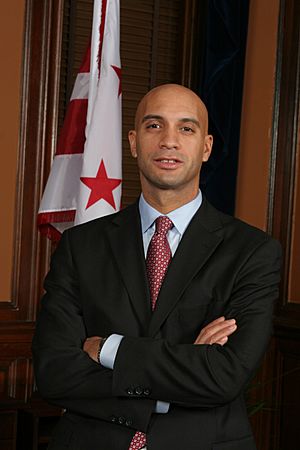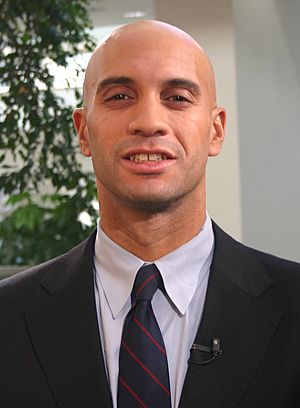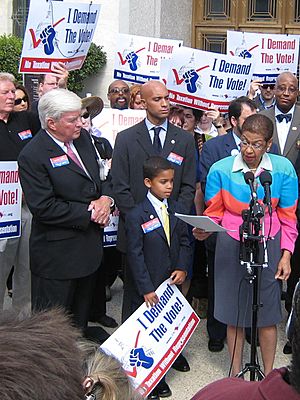Adrian Fenty facts for kids
Quick facts for kids
Adrian Fenty
|
|
|---|---|
 |
|
| Mayor of the District of Columbia | |
| In office January 2, 2007 – January 2, 2011 |
|
| Preceded by | Anthony Williams |
| Succeeded by | Vincent Gray |
| Member of the Council of the District of Columbia from Ward 4 |
|
| In office January 3, 2001 – January 2, 2007 |
|
| Preceded by | Charlene Drew Jarvis |
| Succeeded by | Muriel Bowser |
| Commissioner of the District of Columbia for District 4C03 |
|
| In office 1999–2001 |
|
| Preceded by | Lillian Cooper-Wiggins |
| Succeeded by | Shawn R. Fenty |
| Personal details | |
| Born |
Adrian Malik Fenty
December 6, 1970 Washington, D.C., U.S. |
| Political party | Democratic |
| Spouse | Michelle Cross (separated) |
| Children | 3 |
| Education | Oberlin College (BA) Howard University (JD) |
| Signature | |
Adrian Malik Fenty, born on December 6, 1970, is an American politician. He served as the mayor of the District of Columbia from 2007 to 2011.
Fenty grew up in Washington, D.C. He studied at Oberlin College and Howard University Law School. Before becoming mayor, he spent six years on the D.C. Council. He served one term as mayor. He lost his re-election bid to Vincent C. Gray. After leaving office, Fenty became an advisor for different companies and organizations.
Contents
Adrian Fenty's Early Life and Education
Adrian Fenty was born in Washington, D.C.. He was the middle of three sons. His mother, Jeanette, was Italian-American. His father, Phil, had roots in Barbados and Panama. His parents moved to Washington, D.C., in 1967.
Fenty grew up in the Mount Pleasant neighborhood. His parents owned a shoe store in Adams Morgan. He went to Mackin Catholic High School, where he was on the track team. He earned a degree in English and economics from Oberlin College. Later, he received a law degree from the Howard University School of Law.
Starting His Political Journey
Before working in D.C. politics, Fenty interned for several important U.S. politicians. These included Senator Howard Metzenbaum and Delegate Eleanor Holmes Norton.
He then worked as an aide for Councilmember Kevin P. Chavous. Fenty was also elected to the Advisory Neighborhood Commission (ANC) for district 4C. He also led the 16th Street Neighborhood Civic Association. These roles helped him learn about local government.
Serving on the D.C. Council
In 2000, Adrian Fenty won a seat on the Council of the District of Columbia. He beat the long-serving Councilmember Charlene Drew Jarvis. He won by going door-to-door and meeting many people. He was re-elected for a second term in 2004 without anyone running against him.
As a Council member, Fenty was known for being independent. He disagreed with public funding for a new Major League Baseball stadium. He believed the team owners should pay for it. He also suggested a large program to improve public schools. The Council first opposed it but later approved it. Fenty focused on helping people in his district and taking strong stands on issues.
Running for Mayor in 2006
Fenty started his campaign to become mayor in 2005. The current mayor, Anthony A. Williams, was retiring. Other candidates included Council Chair Linda W. Cropp and Councilmember Vincent Orange.
The race was very close between Fenty and Cropp for a while. Fenty promised to be an energetic and hands-on mayor. He wanted to bring bold new ideas to the city. Cropp emphasized her many years of experience in D.C. government. She wanted to continue the progress made by Mayor Williams.
By July 2006, polls showed Fenty was ahead. Many thought this was because of his strong door-to-door campaign. Fenty won every precinct in the Democratic Primary. This was a unique achievement. He defeated Cropp by a large margin. In the general election, he won with 89 percent of the vote. He became the sixth elected mayor of D.C. since the city gained more local control.
Mayor of the District of Columbia (2007–2011)
A main goal for Mayor Fenty was to improve education. On his first day, he proposed a law to give him control of the public schools. Before this, an elected school board managed them. Past efforts to fix the schools had not worked well. Student test scores and graduation rates were very low.
In April 2007, the D.C. Council approved Fenty's plan. The U.S. Congress and President George W. Bush also approved it. Under the new system, the mayor chose a chancellor to lead the schools. This chancellor reported directly to the mayor. Fenty chose Michelle Rhee to manage the schools. This choice surprised many in education.
The changes led to improvements. Fenty and Rhee cut down on central office staff. They also closed 23 schools with low student numbers. After 2007, student test scores in reading and math went up. SAT scores also improved. Graduation rates increased every year since 2007. Fenty's team also worked on a big project to improve school buildings. They also reached an agreement with the teachers' union. This agreement linked teacher pay to performance.
Fenty's administration also worked to make other city agencies more efficient. He chose Cathy Lanier as the police chief. Under Fenty, Lanier added more police officers to the streets. She also expanded community policing. For example, they made it easier for people to send anonymous text message tips to the police. The number of homicides (murders) in D.C. dropped by 25% in 2009. Fenty reported that homicides were at their lowest level since 1964. Both violent and property crimes also decreased significantly.
Mayor Fenty also supported development projects. These included renovating libraries, parks, and recreation centers. Sixteen new playgrounds opened. The city's largest shopping center, DC USA Shopping Center, also opened. Thousands of affordable homes were built or improved. A program called "Housing First" started to help homeless people find permanent homes. The city also improved emergency medical services. Health care coverage for people without insurance was expanded.
In December 2009, Fenty signed a law to make same-sex marriage legal in the District of Columbia.
While mayor, Fenty was part of the Mayors Against Illegal Guns Coalition. This group worked to reduce gun violence. Fenty was known for carrying three BlackBerry phones. One was for talking directly to the police chief. Another was for other city business. The third was for personal use.
2010 Re-election Campaign
Adrian Fenty officially started his re-election campaign in April 2010. He defended his management style. He promised to remind voters that he made tough decisions for real change.
In August 2010, The Washington Post supported Fenty for re-election. They praised his efforts to fix the public school system.
However, polls showed Vincent C. Gray was ahead. Fenty lost the Democratic primary election to Gray by 10 points. After the results, Fenty said it was very unlikely he would run for public office again.
Life After Being Mayor
After his term as mayor ended, Fenty became an advisor for various companies. In January 2011, he joined Greater Talent Network, a speakers bureau. He also became an advisor for an accounting firm. He was a visiting professor at Oberlin College. He advised Rosetta Stone, a language software company. He also worked with Capgemini Government Solutions, an information technology consulting firm.
In March 2011, Fenty spoke on a TV show called Morning Joe. He supported efforts by Wisconsin Governor Scott Walker to limit public employee unions. Fenty said that most mayors and governors would prefer to manage their teams without union interference. He believed managers could set fair wages and hold employees accountable.
Adrian Fenty's Personal Life
In 1997, Adrian Fenty married Michelle Cross Fenty, a corporate lawyer. They had three children: twin sons born in 2000 and a daughter born in 2008. They separated in January 2013. His son Andrew is a talented tennis player. He played for the University of Michigan.
In August 2013, The Washington Post reported that Fenty was in a relationship with Laurene Powell Jobs. She is the widow of Apple co-founder Steve Jobs. They were last seen together in 2016.
Fenty is an amateur triathlete and runner. While he was mayor, he took part in the Nation's Triathlon and the Washington, D.C. Triathlon. He is also Catholic.
Images for kids
 | Frances Mary Albrier |
 | Whitney Young |
 | Muhammad Ali |



